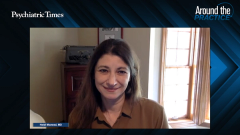
Clinical Impressions From Patient Case #2
Thought leaders discuss what elements to consider when distinguishing between cataplexy and pseudo cataplexy.
Episodes in this series

Thomas E. Scammell, MD: Dr. Benca, what do you think of this story?
Ruth Benca, MD, PhD: Well, it sounds awfully suspicious for narcolepsy with cataplexy. Not only the episodes that sound like cataplexy, but also that they really were exacerbated with the discontinuation of the paroxetine. On the other hand, I've also had psychiatric patients come in and complain to me of weakness or falling episodes that are not cataplexy. So, in a psychiatric patient, you want to be very careful about understanding what are the triggers that brings these on? Do they come on suddenly? To make sure that they really are classic cataplectic episodes.
Thomas E. Scammell, MD: You raise a really good point because diagnosing cataplexy is all about the history. It's the kind of questions you ask and how the patient responds. So, what is it about this particular story that we just described that makes you think cataplexy is likely?
Ruth Benca, MD, PhD: I think it's the paroxetine withdrawal and the episodes increasing afterwards to me the most suspicious. And certainly, with the combination of the excessive sleepiness.
Thomas E. Scammell, MD: Doother people have thoughts of what is compelling with that story?
Phyllis C. Zee, MD, PhD: I think it's cataplexy. It is triggered by a strong emotion. I think she was telling a joke. The antigravity muscles, the slumping, I mean, this is as classic as you can get of a description and certainly not hidden, certainly not a mild form. I think this should make people suspicious of that.
Thomas E. Scammell, MD: Emotionally triggered, brief, and I would add a real functional impact because this touches on what Dr. Benca was saying a second ago about episodes of weakness or general feelings of weakness in people who all have concomitant psych problems. Sometimes we refer to those feelings of weakness as pseudo cataplexy. How do you tease those apart?
Ruth Benca, MD, PhD: I think one of the issues, of course, is what is triggering them? Do they come on suddenly? Do they have the classic presentation as Phyllis described, like the head drooping, the antigravity muscles, the slurred speech, versus just “I feel like I'm going to fall.” The psychiatric or the pseudo cataplexy are a lot vaguer, I think, and don't have the clean immediate onset and then of course, the offset.
Thomas E. Scammell, MD: And the duration can be longer. Triggers can be typical negative emotions, like grief or just feeling overwhelmed with anxiety.
Ruth Benca, MD, PhD: Stress, perhaps.
Thomas E. Scammell, MD: Yes, “I'm feeling weak with stress,” would certainly point me in a different direction.
Phyllis C. Zee, MD, PhD: Yes. That sounds like anxiety. Sometimes anxiety presents with “I'm feeling weakness with stress. I feel weak all over. I can't move.” It's really a lot of stress.
Ruth Benca, MD, PhD: Panic attacks can make it worse.
Transcript edited for clarity
Newsletter
Receive trusted psychiatric news, expert analysis, and clinical insights — subscribe today to support your practice and your patients.












